牛津译林版高中英语选修七M7U2Welcometotheunit
牛津译林版高中英语选修七《Unit2Fitforlife》SectionAWelcometotheunitReading(含答案解析).docx
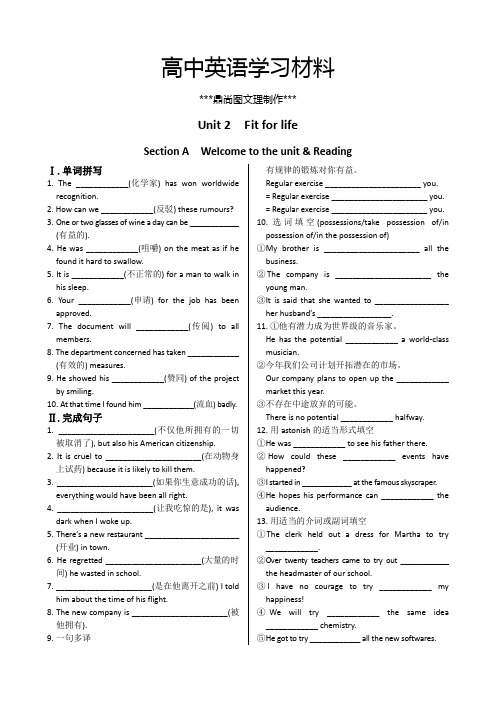
高中英语学习材料***鼎尚图文理制作***Unit 2 Fit for lifeSection A Welcome to the unit & ReadingⅠ.单词拼写1. The ____________(化学家) has won worldwide recognition.2. How can we ____________(反驳) these rumours?3. One or two glasses of wine a day can be ____________ (有益的).4. He was ____________(咀嚼) on the meat as if he found it hard to swallow.5. It is ____________(不正常的) for a man to walk in his sleep.6. Your ____________(申请) for the job has been approved.7. The document will ____________(传阅) to all members.8. The department concerned has taken ____________ (有效的) measures.9. He showed his ____________(赞同) of the project by smiling.10. At that time I found him ____________(流血) badly. Ⅱ.完成句子1. ______________________(不仅他所拥有的一切被取消了), but also his American citizenship.2. It is cruel to ______________________(在动物身上试药) because it is likely to kill them.3. ______________________(如果你生意成功的话), everything would have been all right.4. ______________________(让我吃惊的是), it was dark when I woke up.5. There’s a new restaurant ______________________ (开业) in town.6. He regretted ______________________(大量的时间) he wasted in school.7. ______________________(是在他离开之前) I told him about the time of his flight.8. The new company is ______________________(被他拥有).9.一句多译有规律的锻炼对你有益。
牛津译林版高中英语选修七M7U2Welcometotheunit
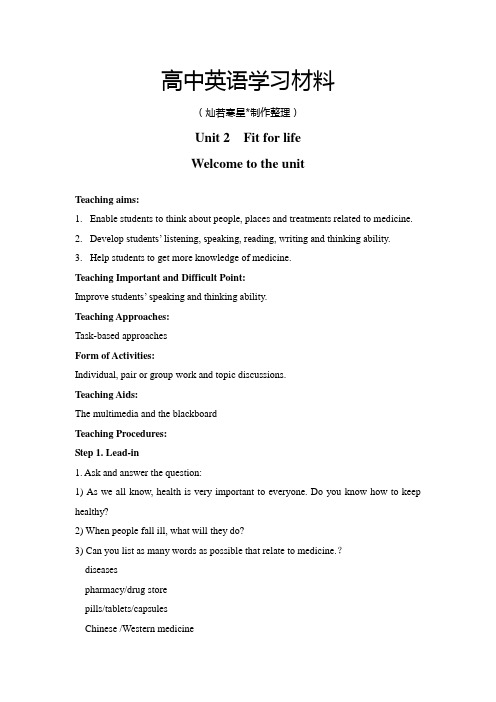
高中英语学习材料(灿若寒星*制作整理)Unit 2 Fit for lifeWelcome to the unitTeaching aims:1.Enable students to think about people, places and treatments related to medicine.2.Develop students’ listening, speaking, reading, writing and thinking ability.3.Help students to get more knowledge of medicine.Teaching Important and Difficult Point:Improve students’ speaking and thinking ability.Teaching Approaches:Task-based approachesForm of Activities:Individual, pair or group work and topic discussions.Teaching Aids:The multimedia and the blackboardTeaching Procedures:Step 1. Lead-in1. Ask and answer the question:1) As we all know, health is very important to everyone. Do you know how to keep healthy?2) When people fall ill, what will they do?3) Can you list as many words as possible that relate to medicine.?diseasespharmacy/drug storepills/tablets/capsulesChinese /Western medicineeffect/side effect …...4) Can you list as many jobs as possible that relate to medicine?chemisteye doctor/opticiandentistphysiciansurgeon……Step 2. Picture talkingA guessing game:1. a person who prepares and sells medicine2. a person who examines people’s eyes to see if they need to wear glasses3. a person who takes care of people’s teeth4. a person who has general skill to treat physical problems5. a person who performs medical operations6. a person who helps doctors to look after patientsWork in groups and discuss the four pictures on the screen.Picture 11.Show a picture of a chemist’s selling medicines on the screen.2.Questions:1)What is the man in white?2)What qualities does a person need to be a chemist?Picture 21. Show a picture of acupuncture treatment on the screen.2. Questions:1)What is on the woman’s ear?2)What can acupuncture do?Picture 31.Show a picture of an operation in an operating theatre on the screen.2.Questions:1)What are the doctors and nurses doing?2)What happens during an operation?Picture 41.Show a picture a doctor testing a boy’s eyes of agriculture on the screen.2.Questions:1)What is the student doing?2)Do you have good eyesight? How can you protect your eyes?Step 3 Discussion1.Have you ever seen a doctor? If so, what happened?2. Have you ever received medical treatments? What did it feel like?3. Would you like to do any of the jobs shown in the pictures? Why or why not? Step 4 Further discussion1. Do you think medicine only has good effects? Why?2. What do you know about its side effects?Step 5 Homework1. Surf the internet for more information about medicine.2. Write a short passage about your experience of receiving medical treatments.。
牛津译林版高中英语选修七Module7Unit2FitforlifeWelcometotheunit
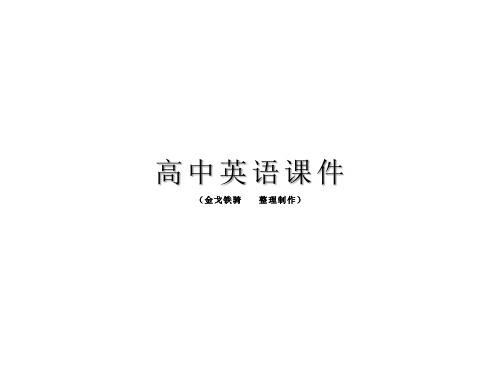
How can you protect your eyes?
—Let’s think
Question
• The most common treatment is to take medicines.
• Do you know any person related to the discovery or invention of medicine?
• In the long river of history, medicines changed people’s life; an invention of any kind of a small tablet embodies human being’s superb wisdom, through which, we can see human being’s great desire of keeping fit and cherishing their own lives.
History of Acupuncture
• Chinese warriors who survived the misfortune of being struck by arrows in war reported that while they were injured, their previous disease and pain in other parts of their body had lessened by arrows
remove, damaged)
The doctors are performing an operation. During the process of an operation, the surgeons cut open a part of a person’s body and remove or repair a damaged part.
高中英语牛津版选修七Unit 2 Section Ⅰ Welcome to the unit & Reading — Pre-reading
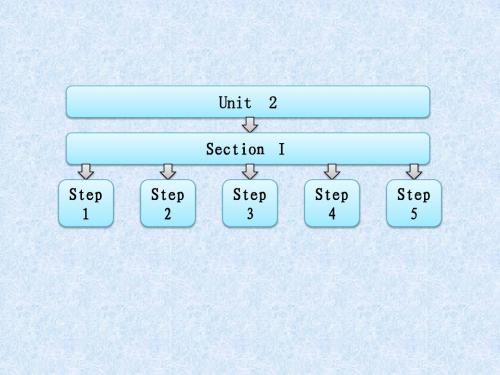
never seen a child has a reaction to an immunization more
serious than sore arms and shortterm fever. “I think parents underestimate (低估) the severity of the
C.Two important medicines - Aspirin and Penicillin.
D.How to keep healthy. 答案:C
返回
2.Which of the following is considered to be the time when
aspirin was invented?
quickly gained advocacy from parents who wanted to protect
their children from a developmental disorder for which there is still no known cause. 返回
Since 1997, there's been a worldwide decline in the number of school children from kindergarten through high school who are fully vaccinated.
牛津译林版高中英语选修七M7U2welcome
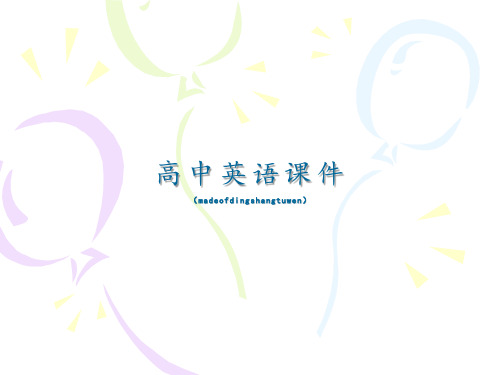
p4
h
3
y
5
1
m
s
c
terminal
d
c
n
c
i
c
disease
2
n
e
nቤተ መጻሕፍቲ ባይዱ
r
A c_h_e_m_is_t_ sells medicine.
• What does a chemist do?
A chemist’s job usually involves preparing and selling medicines.
help lose weight help quit smoking
• Have you ever had such an experience?
• What did it feel like?
• If we need an o_p_e_ra_t_io_n_____, a s_p_ec_i_a_l ______ room called an operating theatre is used.
hemist
• Do you know the origin of acupuncture?
• Acupuncture has its origin in China beginning before 1000 BC.
• What can acupuncture do? • Acupuncture can r_e_li_e_v_e_b_o_d_y_p_a_i.ns
2. the synonym of illness
3. something which is used to treat injury
4. a person who practices general medicine as distinct from surgery
Unit 2 Welcome to the unit Reading 高中英语牛津译林版
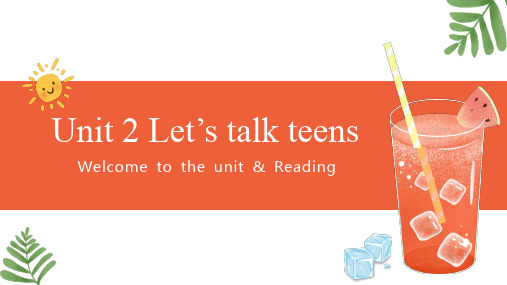
Discussion
Love
Independence
Expectations
Freedom
Patiห้องสมุดไป่ตู้nce
Ambition
Concerns
Eagerness
Parents
Child
Are you always happy with your parent’s unconditional love?
attitude. ● Teenagers’ mental changes are also
important reasons for parent-child tensions.
Read P16-P17, choose true or false and correct the mistakes. 1.It is unusual for teenagers to have difficult relationships with their parents. 2.Teenagers are likely to worry about their physical changes. 3.Parents should always agree with their children to avoid family tensions. 4.Teenagers want both independence and their parents’ love and support. 5.Healthy discussions are necessary to keep the peace between parents and children. 答案 1.F 2.T 3.F 4.T 5.T
译林牛津模块7 Unit 1 Welcome to the unit(译林牛津版高二英语选修七教案教
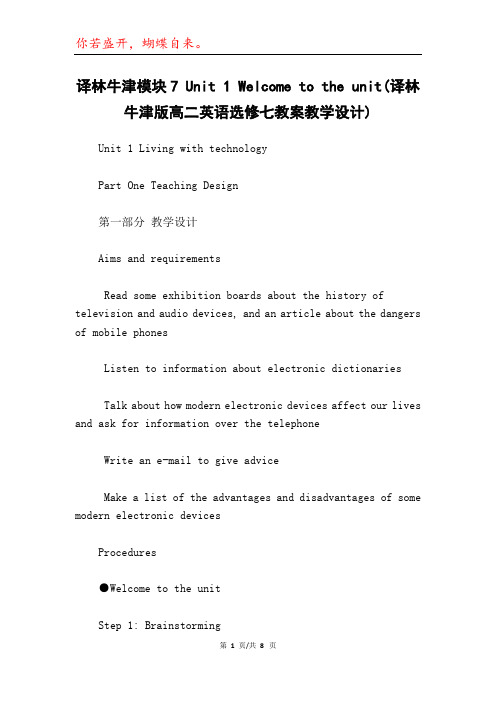
译林牛津模块7 Unit 1 Welcome to the unit(译林牛津版高二英语选修七教案教学设计)Unit 1 Living with technologyPart One Teaching Design第一部分教学设计Aims and requirementsRead some exhibition boards about the history of television and audio devices, and an article about the dangers of mobile phonesListen to information about electronic dictionariesTalk about how modern electronic devices affect our lives and ask for information over the telephoneWrite an e-mail to give adviceMake a list of the advantages and disadvantages of some modern electronic devicesProcedures●Welcome to the unitStep 1: BrainstormingNowadays, it seems that man cannot live without such electrical and electronic products as microwave ovens, refrigerators, TV sets, air conditioners, washing machines, electric fans, mobile phones, digital cameras and vacuum cleaners. Do you agree with me?Which do you think is the most useful?What electrical and electronic products do you use in your studies and in your life? (electronic dictionaries, computers, CD players, MP3)Are they helpful or just make you lazier?For referenceElectronic dictionaries give students quick responses in their reading. Students using electronic dictionaries need less time in reading than those who use paper dictionaries. Moreover, electronic dictionaries can provide correct pronunciation to students, which a paper dictionary cannot. The number of people using electronic dictionaries is increasing greatly.As we can see, with the rapid development of electronic technology in the last few decades, electrical and electronic products have made ou r lives more convenient. I’d like to give you some examples.Now, let’s have a discussion: What do you think life wouldbe like without these products?Step 2: Sharing information1. Let’s enjoy some wonderful ads about some electrical and electronic products. What conclusion can you draw?Man has made remarkable progress in this area in the last few decades.Do you think the progress has made our lives more convenient or has made simple things more complicated?For reference●They are invented to meet people’s needs.●They have improved people’s lives to some degree.●They are developing very quickly.●The radiation from some of the electrical and electronic devices, such as mobile phones, may be h armful to people’s health.●When people buy new electrical of electronic devices, they throw away the old ones. This may generate large amount of waste, which is harmful to the environment.2.Group work. Look at the four pictures at page 1. Let’s study them one by one and try to discuss some questions in groupPicture 1What kind of TV do you have at home?What differences can you find between the TV in your home and the TV in this picture? (Early TV had antennae on top. The screen was very small and could show only black-and-white pictures. The size of the TV was small compared with modern TV, and usually it looked like a wooden box. Early TV also did not have a remote control. The control panel was on one side of the screen.)What kind of pictures did early TV have? (Early TV had black-and-white pictures that were fuzzy.)What other functions do you need in a modern TV?Picture 2What did people need when they wanted to record music in the past? (Tapes and a tape recorder.)How did people record music in the past? (People put the tapes into the recorder, then played the tape with music at one side and pushed the play and record buttons at the other side to record the music onto the blank tape.)Look at the picture. What devices do people need to record music now? (A computer, an MP3 player and some recordingHow do People record music using a computer? (People copy the music from a CD to the computer using recording software. The music will then be digitalized in and played by an MP Player. )Picture 3How do you look up a word in a paper dictionary? (The words in a paper dictionary are arranged in alphabetical order from ‘A’ to ‘Z’. We need to look at the f irst letter of the word and use it to search in the dictionary. If two words start with the same letter, we look at the second letter to decide the alphabetical order. If the first and second letters are the same, we look at the third letter and so on.)How many of you have an electronic dictionary? How do you look up a word in such a dictionary? (We key in the word we want to look up and click the button ‘Enter’. Then the word entry will appear on the screen.)Besides the dictionary, what else can be stored in your electronic dictionary? (There can be a calendar, a list of addresses and phone numbers, memos or a clock. More recent electronic dictionaries have large memory space and some can be used as electronic books with hundreds of books stored inside.)Which do you prefer, an electronic book or a traditional paper book? Why?Picture 4How did people keep in touch in the past? (People sent letters in the past, but letters were slow, and they took from a few days to several months to arrive. Then people invented the telegraph, but the telegraph could send only short sentences. Later, people could communicate via telephone, but the disadvantage was that not everyone had a telephone. Now, people use e-mails to communicate. E-mails are quick, but people without computers and access to the Internet cannot send e-mails. Today, most people use mobile phones to keep in touch with others. The size of a mobile phone is small so people can carry one in a pocket and receive and make calls wherever they are and whenever it is.)What recent developments have been made to mobile phones? (Now, mobile phones have more and more functions. They can send text messages. They can also be used as a digital camera to take still or even moving pictures. People can send the pictures they take to other mobile phones or e-mail addresses. Mobile phones can be connected to the Internet and people can look at web pages with mobile phones. More technologically advanced mobile phones can receive TV signals so that people can watch live TV programmes on their mobile phones.)It is reported that many high school students bring mobile phones to their schools. Do you think high school students should use mobile phones at school? Why or why not?Please express your ideas freely and make sure that all ofyou have a chance to speak.Step 3: Discussion:1. How have different electronic devices changed over time?2. How have these inventions improved people’s lives?Sample answers1. Different electrical and electronic devices have changed a lot over time. Take mobile phones as an example. Mobile phones first appeared in 1947, and they looked much bigger than what we are using nowadays. In the past, they could only provide us with basic services like making phone calls. However, customers now want to be entertained. As a result, developments were made. Nowadays, many new types of phones are available that can connect to the Internet or be used as cameras or MP3 players.2. These inventions have greatly improved people’s lives. Mobile phones are a good example of this. Before mobile phones came into use, people couldn’t make phone calls or receive phone calls if there was no telephone nearby. With mobile phones, people are able to make calls at any time and at any place. Today, many of us are very busy and cannot be expected to wait for a long time. Mobile phones provide us with a chance to keep in touch with others wherever we are.For referenceElectrical and electronic goods help people save a lot of time and make our lives more convenient. However, we cannot ignore that every year electronic and electrical waste is increasing considerably, much of which will do great harm to our environment if not properly dealt with. The governments in many countries have realized the importance of solving the problem and they have been trying to find the solutions, but further attention needs to be given to the problem.Step 4: Homework:1. Collect more information about the development of some electronic and electrical devices.2. Prepare the Reading part.文档内容到此结束,欢迎大家下载、修改、丰富并分享给更多有需要的人。
牛津译林版7AUnit2Welcometotheunit
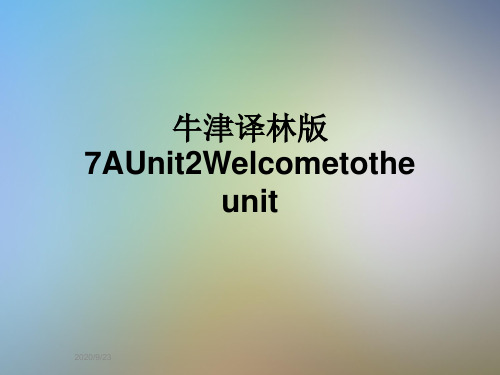
Personal motto
“As far as carrying the torch for the years to come, I don’t know. I just want to be the best basketball player I can be.”
Can you find what they have in common?
Taking exercise is good for our health. All work and no play makes Jack a dull boy. By taking exercise, we can relax our body and mind. At the same time, we can harden our muscle and have a good figure. If we don't take exercise for a long time, we may easily fall sick.
people should not be
ordinary.
2.Efforts may not be
successful, but failed to give
up certain
Kobe Bryant
Los Angeles Lakers – No. 24 Shooting guard Born : August 23, 1978 Nationality: American Height : 1.98 m Weight : 93 kg League : NBA
diving 110 meters hurdles table tennis Volleyball high jump Long jump gymnastics racewalking sailing Weightlifting badminton
- 1、下载文档前请自行甄别文档内容的完整性,平台不提供额外的编辑、内容补充、找答案等附加服务。
- 2、"仅部分预览"的文档,不可在线预览部分如存在完整性等问题,可反馈申请退款(可完整预览的文档不适用该条件!)。
- 3、如文档侵犯您的权益,请联系客服反馈,我们会尽快为您处理(人工客服工作时间:9:00-18:30)。
Unit 2 Fit for life
Welcome to the unit
Teaching aims:
1.Enable students to think about people, places and treatments related to medicine.
2.Develop students’ listening, speaking, reading, writing and thinking ability.
3.Help students to get more knowledge of medicine.
Teaching Important and Difficult Point:
Improve students’ speaking and thinking ability.
Teaching Approaches:
Task-based approaches
Form of Activities:
Individual, pair or group work and topic discussions.
Teaching Aids:
The multimedia and the blackboard
Teaching Procedures:
Step 1. Lead-in
1. Ask and answer the question:
1) As we all know, health is very important to everyone. Do you know how to keep healthy?
2) When people fall ill, what will they do?
3) Can you list as many words as possible that relate to medicine.?
diseases
pharmacy/drug store
pills/tablets/capsules
Chinese /Western medicine
effect/side effect …...
4) Can you list as many jobs as possible that relate to medicine?
chemist
eye doctor/optician
dentist
physician
surgeon……
Step 2. Picture talking
A guessing game:
1. a person who prepares and sells medicine
2. a person who examines people’s eyes to see if they need to wear glasses
3. a person who takes care of people’s teeth
4. a person who has general skill to treat physical problems
5. a person who performs medical operations
6. a person who helps doctors to look after patients
Work in groups and discuss the four pictures on the screen.
Picture 1
1.Show a picture of a chemist’s selling medicines on the screen.
2.Questions:
1)What is the man in white?
2)What qualities does a person need to be a chemist?
Picture 2
1. Show a picture of acupuncture treatment on the screen.
2. Questions:
1)What is on the woman’s ear?
2)What can acupuncture do?
Picture 3
1.Show a picture of an operation in an operating theatre on the screen.
2.Questions:
1)What are the doctors and nurses doing?
2)What happens during an operation?
Picture 4
1.Show a picture a doctor testing a boy’s eyes of agriculture on the screen.
2.Questions:
1)What is the student doing?
2)Do you have good eyesight? How can you protect your eyes?
Step 3 Discussion
1.Have you ever seen a doctor? If so, what happened?
2. Have you ever received medical treatments? What did it feel like?
3. Would you like to do any of the jobs shown in the pictures? Why or why not? Step 4 Further discussion
1. Do you think medicine only has good effects? Why?
2. What do you know about its side effects?
Step 5 Homework
1. Surf the internet for more information about medicine.
2. Write a short passage about your experience of receiving medical treatments.。
